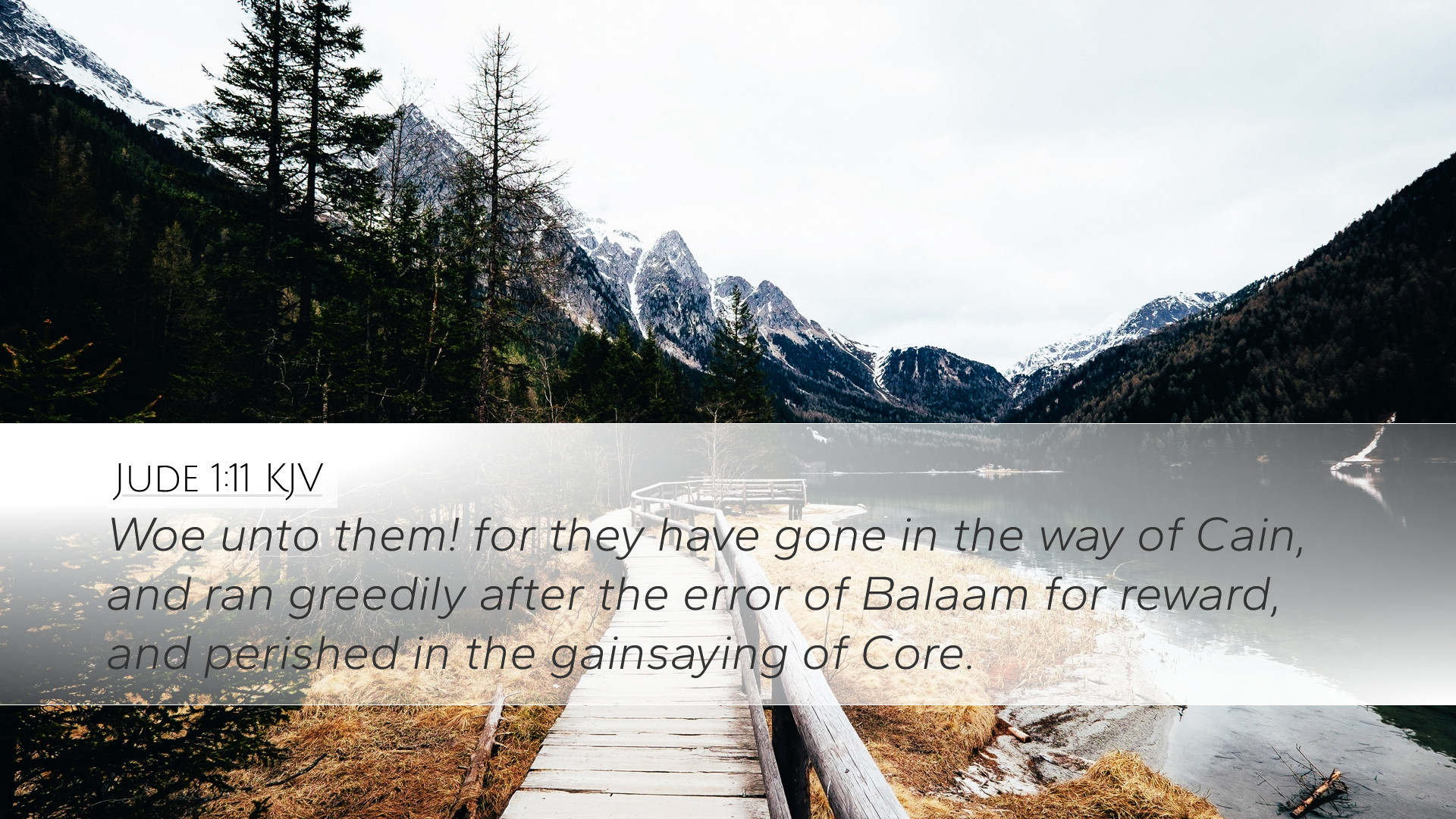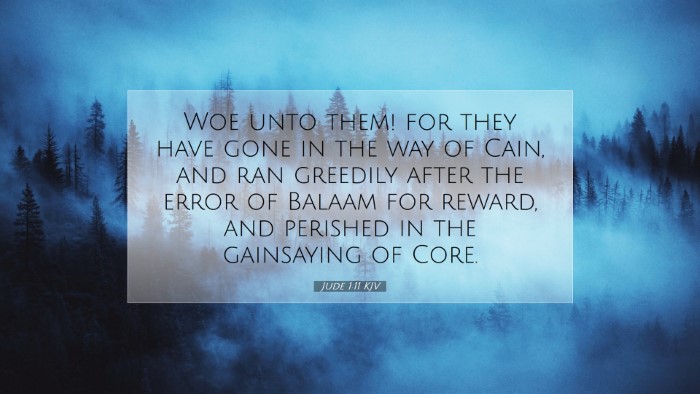Commentary on Jude 1:11
Text of the Verse: "Woe unto them! For they have gone in the way of Cain, and ran greedily after the error of Balaam for reward, and perished in the gainsaying of Core."
Introduction
The epistle of Jude serves as a sobering reminder of the peril of apostasy and the need for vigilance within the Christian community. In verse 11, Jude invokes the examples of Cain, Balaam, and Korah to illustrate the destructive nature of certain behaviors and beliefs that stand in opposition to God's will. This commentary examines the rich theological implications and moral lessons inherent in Jude 1:11, drawing from various public domain sources.
Analysis of Key Phrases
Woe unto them!
This phrase signifies a severe warning against those who engage in the sinful paths Jude describes. Albert Barnes notes that the term "woe" indicates impending judgment and distress, stressing the seriousness with which the author views these actions.
The Way of Cain
Jude identifies Cain to symbolize a profound deviation from God's accepted worship. Matthew Henry explains that Cain's offering was rejected not due to the substance but because of the attitude and heart behind it. Cain's resentment led to jealousy and ultimately murder, exemplifying the dangers of anger and pride. Pastors and theologians are reminded to approach worship with integrity and sincerity, as God looks upon the heart.
Lessons from Cain:
- The Dangers of Jealousy: Cain's jealousy over Abel’s acceptance reveals the dangers of comparing oneself to others.
- Heart Matter in Worship: The essence of worship is not just the act itself but the heart's alignment with God’s will.
Ran Greedily After the Error of Balaam
Jude's reference to Balaam highlights the pursuit of profit over fidelity to God. Adam Clarke remarks that Balaam, although possessing prophetic abilities, succumbed to greed, leading him to betray God's people for material gain. This insight prompts a reflection on the motivations driving ministry and service within the Church.
Lessons from Balaam:
- Warning Against Greed: The seduction of apostasy often lurks behind the desire for financial gain.
- Consequences of Compromise: Balaam's compromise led not only to his own downfall but caused great harm to others.
Perished in the Gainsaying of Core (Korah)
The mention of Korah brings forth the themes of rebellion and dissent against God-ordained authority. Matthew Henry elaborates on Korah's challenge to Moses and Aaron, which culminated in judgment from God. This serves as a stern reminder to honor divinely instituted leadership and to approach spiritual authority with respect.
Lessons from Korah:
- Rebellion Against Divine Authority: Korah’s insurrection serves as a warning for believers to adhere to God’s appointed leaders.
- The Dangers of Division: Korah’s actions led to division, showcasing how dissent can fracture unity within the body of Christ.
Theological Reflection
In Jude 1:11, the mention of Cain, Balaam, and Korah corresponds to distinct themes of rejection, greed, and rebellion respectively. Collectively, they represent a tapestry of warning against the perils of straying from God's path. The apostle writes with pastoral concern, urging believers to retain their fidelity to God amidst moral challenges.
The passage reveals that sin often manifests through recognizable patterns — pride, greed, and rebellion. As such, it serves as a call to self-examination within the community of faith. The dangers of these traits extend beyond individual believers to the collective health of the Church. Therefore, a robust theological framework grounded in humility, stewardship, and respect for God’s order is essential for believers today.
Conclusion
Jude 1:11 urges Christians to heed the lessons from history as recorded in Scripture. The admonition "Woe unto them!" is not merely a cry of despair but a plea for introspection and correction. With rich insights drawn from the public domain commentaries of Matthew Henry, Albert Barnes, and Adam Clarke, this passage opens a window into understanding the grave nature of apostasy.
Such an understanding prepares pastors, students, and theologians to confront the realities of spiritual multiplicity with wisdom and fortitude, ensuring that congregations are guided by the principles of accountability, godly leadership, and sincere worship. As faith communities navigate the complexities of modernity, the timeless truths embedded in Jude remain a beacon of instruction and a call to holiness.


